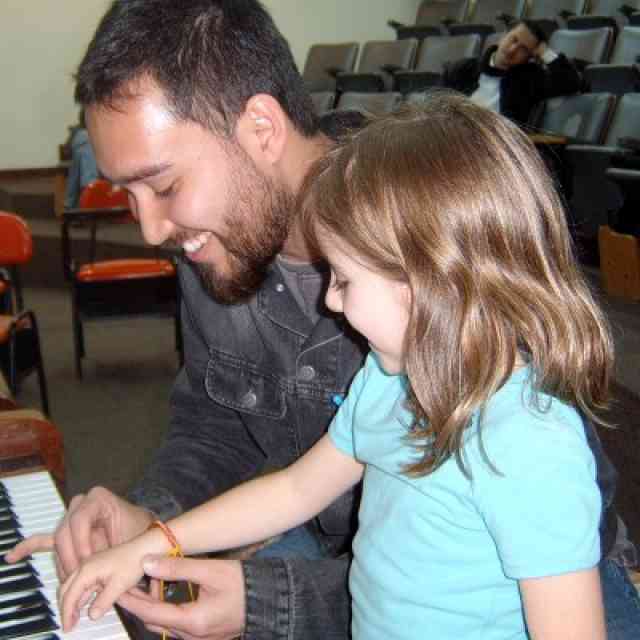“I want to burn my violin,” my six-year-old student, who we’ll call Isla, said in a daring tone, her eyes challenging me to react.
I took a deep breath and tried to center myself before responding to her alarming statement. “Why do you want to do that?” I said, ignoring her horrified mother behind her who was insisting that she didn’t mean it.
She looked surprised that I chose to be curious about her statement instead of scolding her. Her eyes darted around the room like she was thinking about how she wanted to respond. “Because I sound so bad,” she said, hanging her head and looking at the floor.
I smiled at her. “You know what? Sometimes I feel that way when I don’t like my sound too.”
The corners of her mouth went up a little, but my heart sank. I knew that I had been putting off having a tough conversation with her mom about their lack of practice for far too long, and it was past time for me to put my own discomfort aside and try to help this child have a more successful lesson experience.
Isla’s family had recently gone through a lot of transitions, including the birth of a new sibling, and practice had not been happening in their home for many months at this point. Group class attendance was spotty at best. It was also the spring of 2021, and we were just coming back to in-person lessons after Covid. As grateful as I was for the option of virtual learning, many of my younger students, including Isla, had struggled to continue moving forward without in-person contact.
Comments about burning her violin might have been the most extreme thing Isla had said to me during her lessons, but it certainly wasn’t the first time she had expressed her displeasure at having to play the violin. It was clear to me that the problem was that she was coming to lessons unprepared, and she knew she didn’t sound good, and therefore she did not want to play her instrument anymore. My friend, Suzuki teacher Erin Webb, said to me recently that she tells parents that bringing a child to a lesson without adequate practice would be like if, as an adult, you were dependent upon your partner to prepare for a work presentation and your partner did not make the time to help you, but you had to give the presentation unprepared anyway. I like how this analogy directs the parent to consider the child’s position. The child’s preparation is dependent on a parent or practice partner. How frustrating must it feel for them to show up to a lesson unprepared?
I did not blame my six-year-old student for coming to her lesson unprepared, or even for saying that she wanted to burn her violin. I didn’t necessarily blame the parent either. I knew this parent wanted their child to succeed, and I had a lot of empathy for how chaotic her life had been lately while caring for two kids and a new baby. But I did blame myself for letting the situation get so bad for the child before I sought a conversation with the parent. I had thought that by saying nothing, I was showing understanding and giving the parent time to adjust to her life with a new baby. In reality, my avoidance had created a stressful situation for both the parent and the child.
I’m happy to report that I had a successful call with Isla’s mom that led to some changes that allowed Isla to flourish again. I also learned a valuable lesson from this experience, and I have these parent conversations much earlier now, long before the student expresses such intense dislike towards their instrument. Here are some suggestions that have helped me approach difficult conversations about a lack of practice or other issues with parents with more confidence and clarity:
Schedule a time to speak with the parent outside of the lesson when the child is not present. This also shows the parent that the issue is important enough for me to make time in my schedule outside of the lesson to talk about it.
Sit down before the call and map out what needs to be said so that the call will go smoothly. I, like many millennials, dislike talking with parents on the phone and have a tendency to avoid confrontation, so it helps to have a clear plan for how to direct the conversation in front of me as I talk.
Express empathy for the parent and be prepared to listen. Parents need to know that we are not judging them for a lack of practice or other issues in the lessons, especially if they are going through difficulties. We simply want to help their child have a more successful music lesson experience.
Be clear about the problem and what is needed to fix it. Sugar coating the situation or trying to make the problem appear smaller than it is doesn’t help anyone. As Brene Brown says, “Clear is kind.”
Have some concrete suggestions ready to go. If we are going to point out a problem, it’s important to have some suggestions for how to fix it. For the student I mentioned above, I suggested hiring a university student as an additional practice partner to help support the mom a few days a week and it changed everything for this family. I also had suggestions for how to get more listening in and how to arrange some carpooling with other families for better group class attendance. Obviously, these specific options are not feasible for every family, and it’s important to partner with the parent to find options that work best for their child and family situation.
It’s been three years since Isla told me she wanted to burn her violin, and I swell with pride every time I see her play with tall posture and beautiful tone. Even though practice hasn’t always been a straightforward path for her family, she has become a confident performer. She jumps at any opportunity to lead in group class, and most of all, she enjoys playing the violin. None of this would have been possible for her if I had not been willing to step outside my comfort zone and have a difficult conversation with her mom. (And, if I’m being honest, several more difficult conversations over the last three years. One is rarely enough for lasting change!) If I had not been brave enough to open that dialogue and search for solutions, I doubt she would be playing the violin at all anymore. Maybe the accomplished students we long for are right there waiting for us, just on the other side of clear and uncomfortable conversations.







